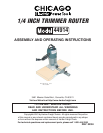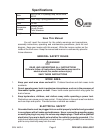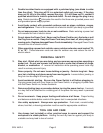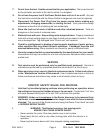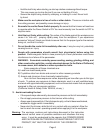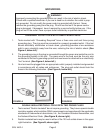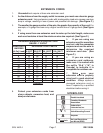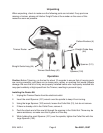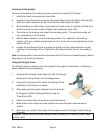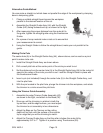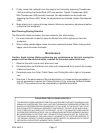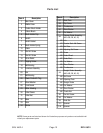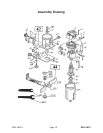
Page 7SKU 44914
EXTENSION CORDS
1.
Grounded
tools require a three wire extension cord.
2. As the distance from the supply outlet increases, you must use a heavier gauge
extension cord. Using extension cords with inadequately sized wire causes a serious
drop in voltage, resulting in loss of power and possible tool damage. (See Figure C.)
3. The smaller the gauge number of the wire, the greater the capacity of the cord. For
example, a 14 gauge cord can carry a higher current than a 16 gauge cord. (See Figure
C.)
4. If using more than one extension cord to make up the total length, make sure
each cord contains at least the minimum wire size required. (See Figure C.)
5. If you are using one
extension cord for more than
one tool, add the nameplate
amperes and use the sum to
determine the required
minimum cord size. (See
Figure C.)
6. If you are using an
extension cord outdoors,
make sure it is marked with
the suffix “W-A” (“W” in
Canada) to indicate it is
acceptable for outdoor use.
7. Make sure your
extension cord is properly
wired and in good electrical
condition. Always replace a
damaged extension cord or
have it repaired by a qualified
electrician before using it.
8. Protect your extension cords from
sharp objects, excessive heat, and
damp or wet areas.
REQUIRED MINIMUM EXTENSION CORD
GAUGE - 110 VOLT
EXTENSION CORD LENGTH
0-25 FT. 25-50 FT. 50-100 FT. 100-150 FT.
6
8
10
12
14
16
18
20
22
24
26
28
30
18
16
16
16
14
14
14
12
12
12
10
10
10
16
16
14
14
12
12
12
12
10
10
10
10
10
14
12
12
10
10
10
8
8
8
8
8
6
6
12
10
10
8
8
8
8
6
6
6
6
4
4
NAMEPLATE
AMPERES
(At Full Load)
FIGURE C
Double Insulated
Canadian Standards
Association
Underwriters
Laboratories, Inc.
Volts Alternating Current
Amperes
No Load Revolutions
per Minute (RPM)
A
V ~
n
o
xxxx/min.
SYMBOLOGY
REV 02/04



